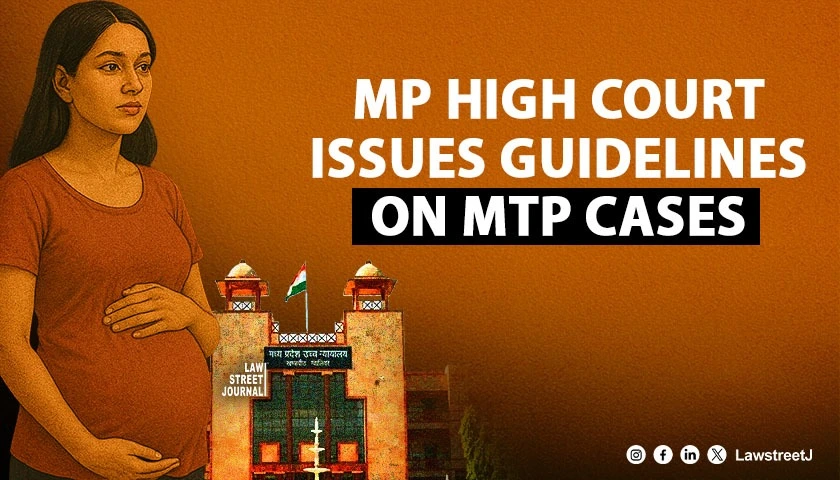Madhya Pradesh: The Madhya Pradesh High Court has issued detailed guidelines for handling medical termination of pregnancy cases, emphasizing that the consent of the pregnant woman is paramount, and directing medical boards to provide complete and clear opinions in accordance with the Medical Termination of Pregnancy Act, 1971.
Justice Vishal Mishra delivered the judgment while addressing the concerning practice of casual referrals to the High Court in MTP cases.
The court dealt with a case involving a 17-year-old rape survivor who was 28 weeks pregnant. The victim had clearly expressed her wish to continue the pregnancy and had reportedly married the accused, yet the matter was still referred to the High Court by the Second Additional Sessions Judge, Amarpatan.
Justice Mishra emphasized the fundamental principle of reproductive autonomy, stating, “The consent of a pregnant woman in decisions of reproductive autonomy and termination of pregnancy is paramount. Once there is no consent, no order regarding termination of pregnancy can be passed.”
The court relied heavily on the Supreme Court’s ruling in A vs. State of Maharashtra (2024), which established that “the consent of the pregnant person in matters of reproductive choices and abortion is paramount” and that “the choice to continue pregnancy to term, regardless of the court having allowed termination of the pregnancy, belongs to the individual alone.”
Justice Mishra further noted a significant procedural issue, observing, “It is generally seen that in cases under the Medical Termination of Pregnancy Act, 1971 (MTP Act), the references are made to this Court in a casual manner.”
The court clarified the jurisdictional framework under the MTP Act, explaining that trial courts and sessions courts have jurisdiction to pass orders for termination of pregnancy when the pregnancy does not exceed 24 weeks, based on proper medical opinion and consent. The court stated, “Such cases are not required to be referred to this Court for termination of pregnancy.”
For cases where pregnancy exceeds 24 weeks, the court reiterated guidelines established in an earlier Division Bench judgment (WP No. 5184 of 2025), which held that “in case of survivors of sexual assault or rape or incest, where the pregnancy exceeds 24 weeks, permission from the High Court is required and termination of such pregnancy is not permissible under the Medical Termination of Pregnancy Act, 1971.”
A critical observation made by Justice Mishra concerned the quality of medical reports submitted to the court. The judge noted, “It is also seen that the opinions of the medical board placed before this Court for consideration are not giving complete information as required under the MTP Act.”
The court directed medical boards to provide comprehensive opinions that specifically address the requirements under Section 3 of the MTP Act, including:
“(i) the opinion formed is in good faith, (ii) the continuance of the pregnancy would involve a risk to the life of the pregnant woman or grave injury to her physical or mental health, and (iii) there is a substantial risk that if the child were born, it would suffer from any serious physical or mental abnormality.”
The court further emphasized that “the Medical Board duly constituted in terms of Section 3 of the MTP Act is directed to provide complete, cogent, and clear opinions with respect to the cases falling under the MTP Act, 1971.”
The court also outlined detailed Standard Operating Procedures (SOPs) for cases where the pregnancy exceeds 24 weeks in survivors of sexual assault, rape, or incest, requiring immediate forwarding of such cases through proper judicial channels to ensure expeditious handling.
In the present case, the court found no basis for the referral since the victim had not consented to termination and wished to continue the pregnancy. The medical report dated August 22, 2025, had indicated that “the fetus has crossed the age of viability” and that “pregnancy can be terminated/or continued as per the consent of victim/guardians.”
The court disposed of the petition while directing the Registrar General to circulate the order to all Principal District & Sessions Judges of the State and the State Medical Board for implementation.
Case Title: Prosecutrix X vs. The State of Madhya Pradesh & Others




.jpeg)

![Supporting defamatory WhatsApp posts doesn’t constitute involvement in offence of defamation: MP HC [Read Order]](/secure/uploads/2024/09/lj_6675_WhatsApp_Image_2024-09-16_at_12.24.54_PM.webp)




